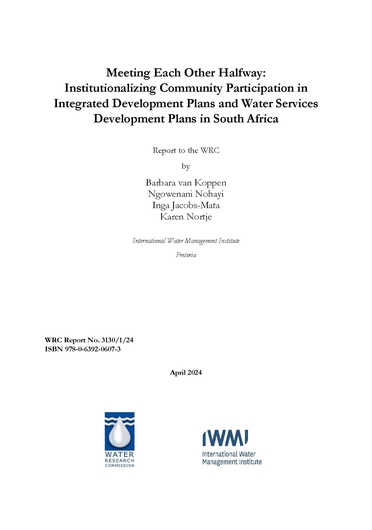Meeting each other halfway: institutionalizing community participation in integrated development plans and water services development plans in South Africa
Abstract
South Africa’s Integrated Development Plan (IDP) and Water Services Development Plan (WSDP) processes provide a legally binding framework, or so-called ‘long route to accountability’, in which citizens can hold their elected political representatives accountable. This includes municipalities’ prioritization and allocation of available internal and external financial, technical and institutional resources for service delivery, and the appointment of internal or external service providers to that end. On the ground, communities interact directly with these service providers in a short route to accountability. However, when it comes to participation for improved water services, communities in low-income rural and urban areas seem inactive. Instead, they protest on the streets. Addressing this void, the Department of Water and Sanitation (DWS) started establishing and supporting Water and Sanitation Community Forums (WSCFs). In collaboration with DWS and eight WSCFs, and supported by the Water Research Commission (WRC), the International Water Management Institute (IWMI) implemented the project ‘Institutionalizing inclusive community-led planning of water supply in IDP and WSDP’. The project examined the stumbling blocks in the implementation of this long route to accountability or in other institutional issues that seem to ignore ordinary community members in under-resourced settings. This evidence is the basis for recommendations to revive the IDP and active participation in the water sector.
The project has two main outputs. The user-friendly “Guidelines for Water and Sanitation Community Forums, municipal officials, and other decision-makers to integrate participatory planning into Integrated Development Plan and Water Services Development Plan processes” synthesize the experiences and aspirations of the WSCFs, as emerged from direct and mutual engagements and dialogues. The present report combines these experiences with extensive literature review on the South African context, disentangling public water services delivery according to the World Bank’s long and short routes to accountability.
Our analysis suggests main obstacles in the first leg of the long route to accountability, in which communities express their problems and priorities in the IDP processes via the wards up to the mayor of the Water Services Authority. Voices about specific water issues are quite technical and get lost amidst of many other needs. Even if communities communicate acute problems of lack of maintenance and breakdowns of municipal infrastructure, response is slow or absent. Further, officials tend to focus on municipal systems only. Yet, where municipal water services fail or haven’t been implemented as yet, communities find alternatives. Communities already take over some operation and maintenance of municipal systems and are keen to formalise. Communities also participate actively from the planning phase onwards in small systems by NGOs, donors, or private sector, although post-construction support remains needed. Further, especially in rural areas, many individuals or small groups invest in their own sustainable self-supply. Support to self-supply is cost effective and sustainable. In these various existing or potential co-management modalities, communities and municipal officials or other support agencies meet each other halfway to improve access to water, which none can achieve on its own.
However, without clear community voices bottom-up in the first leg of the long route to accountability, decision-making by both politicians and technical departments is, inevitably, top-down in the second leg of the long route to accountability. Once a few selected projects have crystallized ‘behind closed doors’, they become parachute projects, without genuine involvement by the community from the planning and design phase onwards. IDP processes risk become just tick-boxing to show compliance. Lack of accountability to communities in this second leg of the long route to accountability, at its turn, contributes to some of the well-known challenges of Water Services Authorities: debts, bias to new infrastructure instead of maintenance even in low-income areas, failing free basic water services, and general lack of transparency, if not corruption, in complex horizontal and vertical coordination requirements, all of which is compounded by an overall lack of technical capacity.
Based on this evidence, the study recommends the further institutionalization of the WSCFs in the IDP, WSDP and WSA structures and developing their technical and institutional capacity. With their grounded experiences of local needs and opportunities in the short route to accountability they provide precious information and agency to governmental and non-governmental support agencies, including the service providers they mobilise. Fit-for-purpose arrangements to compensate costs or remunerate tasks will secure sustainability. In this way, the current national support to the WSDP to WSA will meet the bottom-up voices in technically and institutionally competent water chapters of the IDPs from local to national level and vice versa. Multi-scale clustered WSCFs, DWS and municipalities in Vhembe already prove this can work well.

